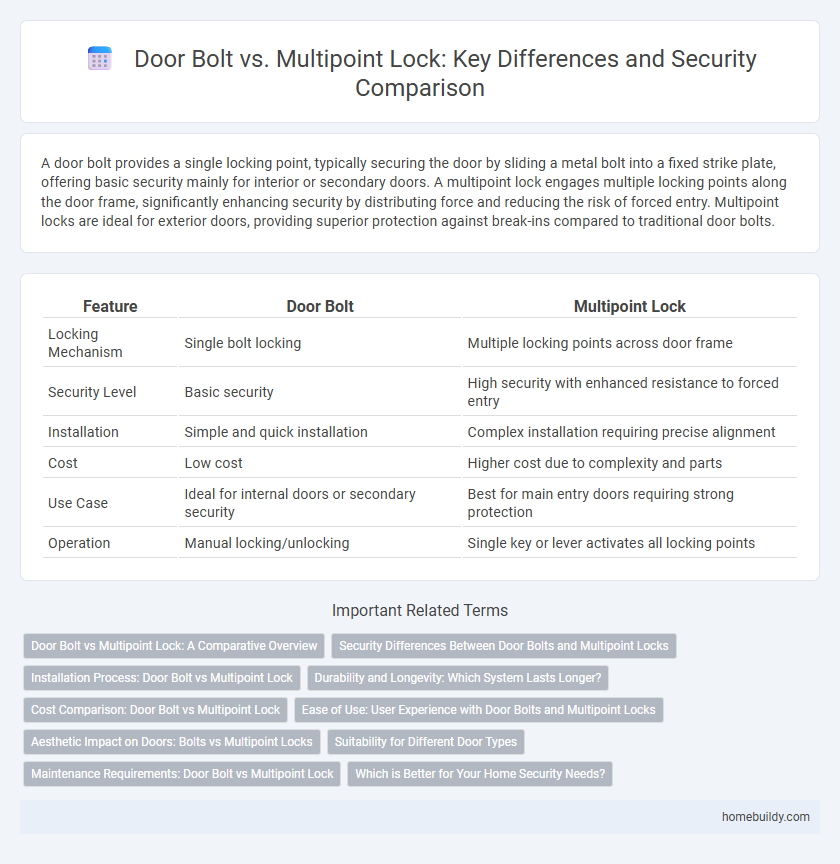A door bolt provides a single locking point, typically securing the door by sliding a metal bolt into a fixed strike plate, offering basic security mainly for interior or secondary doors. A multipoint lock engages multiple locking points along the door frame, significantly enhancing security by distributing force and reducing the risk of forced entry. Multipoint locks are ideal for exterior doors, providing superior protection against break-ins compared to traditional door bolts.
Table of Comparison
| Feature | Door Bolt | Multipoint Lock |
|---|---|---|
| Locking Mechanism | Single bolt locking | Multiple locking points across door frame |
| Security Level | Basic security | High security with enhanced resistance to forced entry |
| Installation | Simple and quick installation | Complex installation requiring precise alignment |
| Cost | Low cost | Higher cost due to complexity and parts |
| Use Case | Ideal for internal doors or secondary security | Best for main entry doors requiring strong protection |
| Operation | Manual locking/unlocking | Single key or lever activates all locking points |
Door Bolt vs Multipoint Lock: A Comparative Overview
A door bolt offers straightforward security with a single locking point that secures the door against forced entry, ideal for internal doors or added security on external doors. Multipoint locks enhance protection by engaging multiple locking points along the door frame, distributing force and reducing the risk of break-ins, commonly used in main entrances and patio doors. While door bolts provide simplicity and ease of installation, multipoint locks deliver comprehensive security through advanced locking mechanisms and increased resistance to tampering.
Security Differences Between Door Bolts and Multipoint Locks
Door bolts secure doors by engaging a single, strong metal bolt into the door frame, offering reliable resistance against forced entry at one point. Multipoint locks distribute locking mechanisms across multiple points along the door frame, significantly enhancing security by minimizing potential weak spots and providing greater structural reinforcement. The superior distribution of locking points in multipoint locks makes them more effective than door bolts at preventing door warping and forced entry attempts.
Installation Process: Door Bolt vs Multipoint Lock
Door bolts feature a straightforward installation process requiring minimal tools and a single point of reinforcement, making them ideal for quick upgrades on existing doors. Multipoint locks demand precise alignment of multiple locking points along the door frame, necessitating professional installation to ensure seamless operation and enhanced security. The complexity of multipoint lock installation provides superior door stability and resistance to forced entry compared to the simpler door bolt mechanism.
Durability and Longevity: Which System Lasts Longer?
Door bolts generally exhibit higher durability due to their simple mechanical design, consisting of a solid metal bar that directly secures the door into the frame, minimizing wear points compared to multipoint locks. Multipoint locks involve multiple locking mechanisms activated by a single handle, increasing the complexity and potential for mechanical failure over time, especially in high-usage environments. Consequently, door bolts tend to offer longer longevity with less maintenance, making them a preferred choice for durability-focused security solutions.
Cost Comparison: Door Bolt vs Multipoint Lock
Door bolts typically cost between $10 and $50, making them an affordable option for basic security needs, while multipoint locks range from $150 to $500 depending on the brand and features. Installation expenses for door bolts are usually minimal, often involving simple DIY methods, whereas multipoint locks require professional installation that can add $100 to $200 to the total cost. When balancing upfront investment and enhanced security, door bolts offer a budget-friendly solution, but multipoint locks provide comprehensive door reinforcement worth the higher price.
Ease of Use: User Experience with Door Bolts and Multipoint Locks
Door bolts offer straightforward operation with a simple sliding mechanism that enhances ease of use for quick locking and unlocking. Multipoint locks, while providing superior security by engaging multiple locking points, can be more complex to operate, often requiring alignment and multiple turns of a key or handle. Users prioritizing convenience typically prefer door bolts for their intuitive, single-action usability in contrast to the more involved process of securing multipoint locks.
Aesthetic Impact on Doors: Bolts vs Multipoint Locks
Door bolts offer a minimalist aesthetic with discreet hardware that blends seamlessly into door designs, maintaining a clean and uncluttered appearance. Multipoint locks, while providing enhanced security by fastening at multiple points, often add visible locking mechanisms and strike plates that can interrupt the door's smooth surface. Choosing between the two depends on balancing streamlined visual appeal with comprehensive security features.
Suitability for Different Door Types
A door bolt is ideal for interior doors or gates where simple security is sufficient, offering straightforward installation on wood or metal surfaces. Multipoint locks provide enhanced security for exterior doors, especially on uPVC, composite, or wooden entry doors, by locking at multiple points along the frame. Multipoint locks are better suited for front and back doors, while door bolts are practical for secondary or internal doors due to their single locking mechanism.
Maintenance Requirements: Door Bolt vs Multipoint Lock
Door bolts require minimal maintenance, typically involving occasional lubrication and tightening of screws to ensure smooth operation. Multipoint locks demand more frequent attention due to their complex mechanisms, including multiple locking points and moving parts prone to wear and misalignment. Regular servicing of multipoint locks is essential to maintain security performance and prevent potential malfunction.
Which is Better for Your Home Security Needs?
Door bolts provide strong, localized security by reinforcing a single point, making them ideal for internal doors or secondary security measures. Multipoint locks secure the door at multiple points along the frame, offering enhanced resistance against forced entry and are better suited for main external doors. Choosing between a door bolt and a multipoint lock depends on the level of security required and the door's location within the home.
Door bolt vs multipoint lock Infographic

 homebuildy.com
homebuildy.com